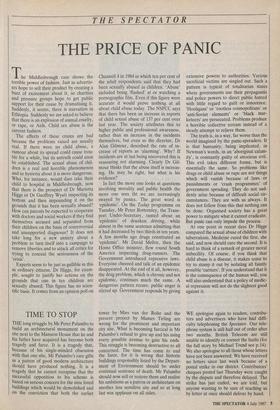THE SPECTATOR
THE PRICE OF PANIC
The Middlesbrough case shows the terrible power of fashion. Just as advertis- ers hope to sell their product by creating a buzz of excitement about it, so charities and pressure groups hope to get public support for their cause by dramatising it. Suddenly, it seems, there is starvation in Ethiopia. Suddenly we are asked to believe that there is an explosion of animal cruelty, or rape, or Aids. Child sex abuse is the current fashion.
The effects of these crazes are bad because the problems raised are usually real. If there were no child abuse, a rumour about its spread could cause trou- ble for a while, but its untruth could soon be established. The sexual abuse of chil- dren is a real and horrible phenomenon and so hysteria about it is more dangerous. Who, for instance, would dare take their child to hospital in Middlesbrough, now that there is the prospect of Dr Marietta Higgs or Dr Geoffrey Wyatt inspecting its bottom and then impounding it on the grounds that it has been sexually abused? How can parents be expected to cooperate with doctors and social workers if they find themselves accused and separated from their children on the basis of controversial and unsupported diagnoses? It does not take long for a new anxiety about a problem .to turn itself into a campaign to remove liberties and to attack all critics for trying to conceal the seriousness of the `crisis'.
Experts seem to be just as gullible in this as ordinary citizens. Dr Higgs, for exam- ple, sought to justify her actions on the grounds that one in ten children are sexually abused. This figure has no scien- tific basis. It comes from an opinion poll on Channell 4 in 1984 in which ten per cent of the adult respondents said that they had been sexually abused as children. 'Abuse' included being 'flashed' at or watching a pornographic film. Even if this figure were accurate it would prove nothing at all about child abuse today. The NSPCC says that there has been an increase in reports of child sexual abuse of 137 per cent over last year. The society attributes this to higher public and professional awareness, rather than an increase in the incidents themselves, but even so the director, Dr Alan Gilmour, described the rate of in- crease of reports as 'alarming'. Why? If incidents are at last being uncovered this is reassuring not alarming. Clearly Dr Gil- mour thinks that the abuse itself is increas- ing. He may be right, but what is his evidence?
In fact the more one looks at questions involving morality and public health the more one sees tht we are increasingly swayed by panics. The great word is `epidemic'. On the Today programme on Tuesday, Mr Peter Bottomley, the Trans- port Under-Secretary, ranted about an `epidemic' of drunken driving, while almost in the same sentence admitting that it had decreased by two thirds in ten years. A few months ago drugs constituted an `epidemic'. Mr David Mellor, then the Home Office minister, flew round South America inspecting drug-runners. The Government introduced repressive laws. Everyone cheered and talk of an epidemic disappeared. At the end of it all, however, the drug problem, which is chronic and not epidemic, continues much the same. A dangerous pattern recurs: public anger is stirred up. Government responds by giving extensive powers to authorities. Various sacrificial victims are singled out. Such a pattern is typical of totalitarian states where governments use their propaganda and police powers to direct public hatred with little regard to guilt or innocence. `Hooligans' or 'rootless cosmopolitans' or `anti-Soviet elements' or 'black mar- keteers' are persecuted. Problems produce a horrible collective scream instead of a steady attempt to relieve them.
The truth is, in a way, far worse than the world imagined by the panic-spreaders. It is that humanity, being implicated, in Newman's words, in an 'aboriginal calam- ity', is constantly guilty of atrocious evil. This evil takes different forms, but is essentially the same. So problems like drugs or child abuse or rape are not things which will vanish because of laws or punishments or 'crash programmes' of government spending. They do not sud- denly arise because of difficult social cir- cumstances. They are with us always. It does not follow from this that nothing can be done. Organised society has a great power to mitigate what it cannot eradicate. But panic can only impede the process.
At one point in recent days Dr Higgs compared the sexual abuse of children with tuberculosis. Medicine cured the first, she said, and now should cure the second. It is hard to think of a remark of greater moral imbecility. Of course, if you think that child abuse is a disease, it makes sense to try to stamp it out by isolating all faintly possible 'carriers'. If you understand that it is the consequence of the human will, you will also understand that a policy of medic- al repression will not do the slightest good against it.


















































 Previous page
Previous page